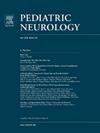Survey of Child Neurologists Highlights a Missed Opportunity for Identifying and Treating Motor Impairments in Autism
IF 2.1
3区 医学
Q2 CLINICAL NEUROLOGY
引用次数: 0
Abstract
Background
Motor impairments, such as motor delays, atypical gait, dyspraxia, and poor coordination, are highly prevalent among individuals with autism spectrum disorder (ASD). Motor impairments are detrimental to multiple aspects of development but are often underdiagnosed and undertreated in children and adolescents with ASD. Child neurologists are specialists who provide clinical care for autistic patients across the lifespan. However, little is known about how child neurologists understand, diagnose, and treat motor impairments in children with ASD.
Methods
In this preliminary study, we surveyed child neurologists (N = 100) on their knowledge of and clinical practices addressing motor impairments in pediatric patients with ASD. Our survey also sought to identify potential barriers to care and medical education efforts that may mitigate existing gaps.
Results
We found most child neurologists were not confident that motor impairments were an associated feature of ASD, do not frequently evaluate for motor impairments, lack sufficient tools for motor evaluations with autistic children, face multiple barriers to providing interventions, and do not receive adequate clinical training regarding this topic.
Conclusions
These preliminary findings suggest that substantial gaps in awareness about motor impairments in ASD persist among practicing child neurologists. Though child neurologists are trained to assess motor function, our results highlight a missed opportunity in the setting of ASD. Child neurologists would benefit from greater attention and resources to learn, evaluate, and treat motor impairments as part of holistic patient care for individuals with ASD.
儿童神经学家的调查强调了自闭症中运动障碍的识别和治疗的错失机会
运动障碍,如运动迟缓、非典型步态、运动障碍和协调性差,在自闭症谱系障碍(ASD)患者中非常普遍。运动障碍对发育的多个方面都是有害的,但在患有ASD的儿童和青少年中往往没有得到充分的诊断和治疗。儿童神经科医生是为自闭症患者提供终身临床护理的专家。然而,关于儿童神经学家如何理解、诊断和治疗自闭症儿童的运动障碍,人们知之甚少。方法在这项初步研究中,我们调查了100名儿童神经科医生对儿童ASD患者运动障碍的认识和临床实践。我们的调查还试图确定可能减轻现有差距的护理和医学教育工作的潜在障碍。结果我们发现大多数儿童神经科医生不相信运动障碍是ASD的相关特征,不经常评估运动障碍,缺乏足够的工具来评估自闭症儿童的运动,在提供干预措施方面面临多重障碍,并且没有接受足够的临床培训。这些初步发现表明,在执业儿童神经科医生中,对ASD运动障碍的认识仍存在实质性差距。虽然儿童神经科医生接受过评估运动功能的培训,但我们的研究结果强调了在自闭症谱系障碍的情况下错失的机会。儿童神经学家将受益于更多的关注和资源,以学习、评估和治疗运动障碍,作为ASD患者整体护理的一部分。
本文章由计算机程序翻译,如有差异,请以英文原文为准。
求助全文
约1分钟内获得全文
求助全文
来源期刊

Pediatric neurology
医学-临床神经学
CiteScore
4.80
自引率
2.60%
发文量
176
审稿时长
78 days
期刊介绍:
Pediatric Neurology publishes timely peer-reviewed clinical and research articles covering all aspects of the developing nervous system.
Pediatric Neurology features up-to-the-minute publication of the latest advances in the diagnosis, management, and treatment of pediatric neurologic disorders. The journal''s editor, E. Steve Roach, in conjunction with the team of Associate Editors, heads an internationally recognized editorial board, ensuring the most authoritative and extensive coverage of the field. Among the topics covered are: epilepsy, mitochondrial diseases, congenital malformations, chromosomopathies, peripheral neuropathies, perinatal and childhood stroke, cerebral palsy, as well as other diseases affecting the developing nervous system.
 求助内容:
求助内容: 应助结果提醒方式:
应助结果提醒方式:


